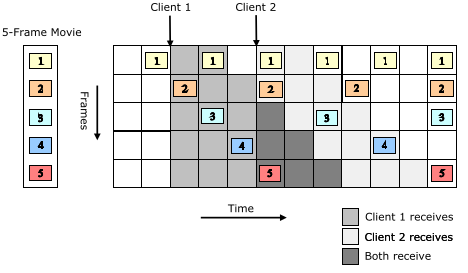
Abstract
Widespread availability of high-speed networks and fast, cheap computation have rendered high-quality Media-on-Demand (MoD) feasible. Research on scalable MoD has resulted in many efficient schemes that involve segmentation and asynchronous broadcast of media data, requiring clients to buffer and reorder out-of-order segments efficiently for serial playout.
In such schemes, buffer space requirements run to several hundred megabytes and hence require efficient buffer management techniques involving both primary memory and secondary storage: while disk sizes have increased exponentially, access speeds have not kept pace at all.
The conversion of out-of-order arrival to in-order playout suggests the use of external memory priority queues, but their content-agnostic nature prevents them from performing well under MoD loads. In this paper, we propose and evaluate a series of simple heuristic schemes which, in simulation studies and in combination with our scalable MoD scheme, achieve significant improvements in storage performance over existing schemes.
BibTeX (Download)
@inproceedings{Waldvogel2003Efficient,
title = {Efficient Buffer Management for Scalable Media-on-Demand},
author = {Marcel Waldvogel and Wei Deng and Ramaprabhu Janakiraman},
url = {https://netfuture.ch/wp-content/uploads/2003/waldvogel03efficient.pdf},
year = {2003},
date = {2003-01-15},
urldate = {1000-01-01},
booktitle = {SPIE Multimedia Computing and Networking (MMCN 2003)},
address = {Santa Clara, CA, USA},
abstract = {<p>Widespread availability of high-speed networks and fast, cheap computation have rendered high-quality Media-on-Demand (MoD) feasible. Research on scalable MoD has resulted in many efficient schemes that involve segmentation and asynchronous broadcast of media data, requiring clients to buffer and reorder out-of-order segments efficiently for serial playout.</p><p>In such schemes, buffer space requirements run to several hundred megabytes and hence require efficient buffer management techniques involving both primary memory and secondary storage: while disk sizes have increased exponentially, access speeds have not kept pace at all.</p><p>The conversion of out-of-order arrival to in-order playout suggests the use of external memory priority queues, but their content-agnostic nature prevents them from performing well under MoD loads. In this paper, we propose and evaluate a series of simple heuristic schemes which, in simulation studies and in combination with our scalable MoD scheme, achieve significant improvements in storage performance over existing schemes.</p>},
keywords = {Multicast, Video-on-Demand},
pubstate = {published},
tppubtype = {inproceedings}
}



